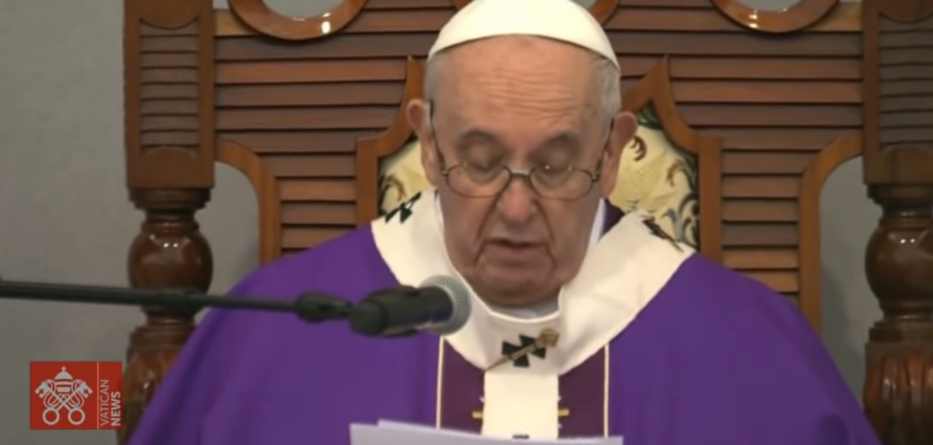Visiting the smallest country in the European Union, and referring several times to the war on the Old Continent, Francis condemned “the infantile and destructive aggression that threatens us”. The pope said that the possibility of a trip to Kyiv was “on the table”.
On the ridgeline from where he has observed the Ukrainian crisis for several weeks, the pope took another step on Saturday April 2 and Sunday April 3 in Malta.
And he did this as soon as he arrived on the island, at the very beginning of his 36-hour journey.
In a speech to the Maltese authorities, Francis condemned “some potentate” who “sadly caught up in anachronistic claims of nationalist interests, is provoking and fomenting conflicts”.
The thinly veiled criticism of the Russian president, Vladimir Putin, was hidden behind a general formulation and a condemnation — traditional for Francis — of all nationalism, but it is there.
Since the beginning of the war, of which he has been following the slightest development, the pope has never so clearly pointed out Russia’s responsibility.
“He goes a little further,” commented a Vatican source at the time.
Autocracy and infantilism
While maintaining the rule he set himself since the beginning of the war of not designating Russia or its president by name as “aggressor”, in order to maintain the possibility for dialogue with Moscow, Francis mentioned, at the presidential palace in Valletta, “the infantile and destructive aggression that threatens us”.
In this country on the periphery of the European Union, the pope compared the “new forms of imperialism” and the “seductions of autocracy” to a form of “childishness”.
It is the same as what was demonstrated by leaders during the Cold War, he stressed.
Once again, Francis, who appeared physically diminished throughout the trip, raised his voice against the arms dealers.
As if recent events have confirmed his belief that weapons — especially nuclear weapons — make the world more dangerous, the pope called for “international peace conferences, where the theme of disarmament will have a central place”.
This is a way for him, who has always advocated a diplomatic resolution to the conflict, to say that peace must be built and consolidated over the long term.
On several occasions, Francis insisted that it is necessary to take into account the people’s “yearning for peace”.
While during these two days he never spoke about the religious dimension of this conflict, for which Patriarch Kirill of Moscow has provided the theological justification since the beginning, on Sunday morning the pope warned about the risk of instrumentalizing God.
“We always run the risk of failing to understand Jesus, of having his name on our lips but denying him by the way that we live. Even as we raise banners displaying the cross,” Francis said before several thousand people gathered in front of Saint Publius Church for Sunday Mass.
A trip to Kyiv “on the table”
Several thousand people, some of whom held Ukrainian flags in their hands, attended under a cloudy sky.
It is a “sacrilegious war”, he added, speaking of the fate of “war-torn Ukraine”, as Russian abuses around Kyiv were revealed.
On the plane from Rome to Malta on Saturday morning, he told journalists that a trip to Kyiv was “on the table”.
Several options are currently being studied by the Vatican, including the possibility of a trip to the Ukrainian capital, from which the Russians have begun, at the same time as the pope was visiting Malta, a gradual withdrawal.
The other possibility would be for Francis to go to the Polish-Ukrainian border, where the Polish president, Andrzej Duda, invited him on Friday April 1, a few hours before his departure for Malta.
Nevertheless, the Vatican questions the effectiveness of such a gesture.
“It is obvious that the pope’s visit will not bring about a cease-fire. The fighting will continue,” predicts a diplomat from the Apostolic Palace, anxious not to devalue the word of the bishop of Rome.
On the other hand, the same source continued, if Francis were to visit Ukrainian refugees, it could be a “very strong symbol on the humanitarian level”.
With thanks to Loup Besmond de Senneville and La Croix International, where this article originally appeared.








